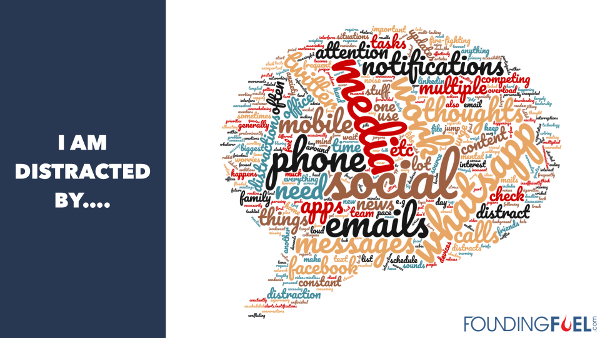Staying indistractable is a superpower. When Nir Eyal said that, he had our attention.
We invited Nir to lead a masterclass on the theme on December 6, on Zoom, with a select group of participants. The session was anchored by Founding Fuel’s Charles Assisi.
Now, most people say that technology is the biggest reason why they get distracted from the jobs that need to be done. This word cloud based on a poll we ran before the Zoom session, bears this out.

But Nir has a contrarian take: he says the source of our distraction is internal, not external (technology).
What can we do to work more efficiently and live better without trade-offs? He’s written a book on that—Indistractable. Here are some takeaways from the Founding Fuel masterclass:
What is distraction?
- In the workplace, what distracts us most is not technology, but other people—our colleagues.
- Just like how a “food detox” (don’t eat carbs for 30 days) doesn’t work, a “digital detox” (stay away from social media, etc.) also doesn’t really work. We need these technologies—we need email and social media, we use them for our livelihood.
- Many people believe in the idea of ego depletion—that willpower is a finite resource. This is pop psychology. Research shows that this is true only for people who believed that willpower was a finite resource. This illustrates the power of a self-limiting belief. It leads to “learned helplessness”.
- The opposite of distraction is not focus; it is traction.
- Traction is any action that pulls you towards what you want to do—the things that you do with intent.
- If you are constantly reacting all day long, you have no time to do the really important stuff that requires long-term diligent effort. For example, checking email is work—but it is a distraction from that big project. Also, now distraction has tricked you into prioritising the urgent at the expense of the important and that is toxic for our productivity.
- Everything we do—even the pursuit of pleasurable sensations—we do for one reason: to avoid discomfort. The human brain is wired for that. So, when you feel lonely, you check Facebook, when you're uncertain, you google.
How do you get traction?
- Time management is pain management.
- These four steps together will help move towards traction:
- Step 1: Master the internal triggers—boredom, loneliness, fatigue, uncertainty.
- Learn to play the task so that it holds your attention long enough to get it done.
- The 10 minute rule: When you find yourself about to get distracted, surf the urge—tell yourself that you will indulge that urge in 10 minutes. By then, most likely, it would have passed.
- Step 2: Make time for traction
- Turn your values into time
- To-Do lists on their own, don't work. But To-Do lists as part of a bigger strategy do work. Instead of planning the output (the finished task), plan the input. Schedule the blocks of time you will devote to what’s important (your values)—physical health, better relationships, and of course, important work.
- If your job requires you to think, have you scheduled a block of time for reflection and thought?
- Schedule sync: Cultural dysfunction is the cause of distraction in the workplace. Sit with your boss (or your team) and go through the schedule together. Now everyone will have transparency on how time is being spent. And reprioritise the really important things.
- Step 3: Hack back the external triggers—the pings, dings and rings—all the things in our environment that can lead to distraction.
- Step 4: Prevent distraction with pacts.
Resources mentioned in the masterclass
- Mindset: The New Psychology of Success, by Carol S. Dweck
- Flow: The Classic Work On How To Achieve Happiness, by Mihaly Csikszentmihalyi
- How to be More Productive and Focus (+ Free Schedule Maker)
More on Founding Fuel Masterclasses
Eating our own dog food: What the team is learning from our masterclasses—it’s work in progress
How platforms really work: A week-long interactive immersion: November 25-29, 2019: A special week of learning on the Future of Platforms for the Founding Fuel community.
- [Read] Making sense of the New Capitalists | By Haresh Chawla: Your smartphone is the gateway for platform businesses to drive their hooks deep into your psyche and pockets, edge out traditional businesses, and reset markets. In doing so, they are becoming monopolies, the likes of which we’ve never seen before. What is fair play in this new world?
- [Read] The difficulty of cross-selling | By NS Ramnath: How far can businesses push the power of platforms to sell new types of products?
- [Read] How platforms really work: A reading list | By NS Ramnath: A curated list of articles, videos and a podcast, as part of our week of learning on the Future of Platforms
- [Watch the Founding Fuel Masterclass] Understanding platform power—disruption or destruction? Platforms, data, analytics are not going to go away. The good news for incumbents: they do have strengths they can play to. The bad news: They will need a different mindset and rethink customer experience.
Masterclass on Transforming Systems with Arun Maira: A special learning project with Arun Maira, one of India’s leading public intellectuals, based on his new book—and perhaps his most influential work—Transforming Systems: Why The World Needs a New Ethical Toolkit. The masterclass includes guest columns on three themes:
- Building Purpose-Driven Networked Organisations: Why Their Time Has Come
- A New Model of Change: Why Complex Global Problems Need Local Systems Solutions
- Creating Ethical Leaders of Tomorrow
